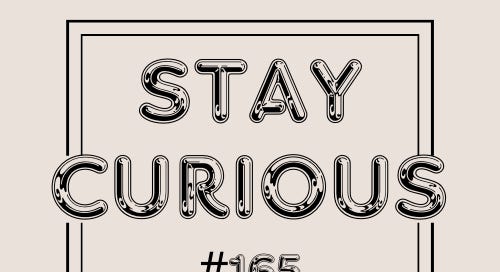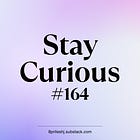📚 Optimal Amount of Fraud, Accountability as a Service, Digital Lending Landscape, Beavers at Work
Robots.txt and AI, Photo Memories and more
Hi, this is post #165.
I just finished Murakami’s “Kafka on the Shore”.
What a beautiful story, the plot kept me intrigued throughout. I kind of hoped it to not finish.
Murakami’s world is not grand, but his detailing and ability to throw surprises makes reading this one a lot of fun. I listened to the audible version, and I highly recommend that one. Narrator has done a brilliant job in giving voice & life to each character. For the last couple of weeks, listening to this book made the drive to work & back such a pleasure.
I am picking up Bonnie Garmus’s “Lessons in Chemistry” next. Let’s see how it goes!
Here’re what I found super interesting and worth sharing this week:
And now, onto today's finds…
🥸 Optimal Amount of Fraud
Patrick McKenzie (patio11) says the optimal amount of fraud is non-zero. He admits that this is counterintuitive and sounds like it is trying a bit too hard to be clever. You should believe it.
His argument is based on a broader idea that crime rates are a policy choice.
It’s a fantastic read - Patrick’s unique takes on how things works make great logical arguments. Sample a few snippets below:
All fraud is a) an abuse of trust causing b) monetary losses for the defrauded and c) monetary gain for the fraudster. You could zero fraud by never trusting anyone in any circumstance.
Trust, though, is an immensely socially useful technology. Human civilization has a fundamental limitation in that all humans can be trivially killed while sleeping. Huge portions of society’s efforts go toward establishing conditions where this trivial vulnerability virtually never gets exploited. God has, reportedly, closed all bug reports claiming that it is a feature and won’t be patched any time soon.
I highly recommend reading this one (and his other works including those covered in #137 and #152)
🫡 Accountability as a Service
Anu Atluru proposes that “accountability as a service” can be a great way to ride on a steep growth path. She expands on possible use-cases:
If you can relate to any of these use-cases, Anu offers “how (the service model)” to help you get started on this journey.
What I love about this piece that she has good answer to some very important questions - How to establish accountability? Will AI do a great job in this aspect?
Give it a read, let me know if you’re up for joining an experiment on this theme? I am looking to build one around ‘writing’ as a core activity. Can talk more 1:1 if you’re interested.
💰 Digital Lending Landscape
I met a lending operator some time back. In our conversation, he had taken pains to describe their business model. My understanding of lending space is at novice level, so what he described to me sounded like a great innovation.
Tales of Bharat’s post covering emerging digital lending models in India offered an expanded view. There are multiple models in work now (and some more in innovation) that are catering to diverse needs of Indian consumer and to comply with the regulations.
Check this piece if you are interested in a 101 on this topic. It covers the fintech-nbfc, co-lending, peer-to-peer (p2p) lending, first loss default guarantee (fldg), loan marketplaces and embedded lending in simple terms.
🤖 Robots.txt and AI
For three decades, a tiny text file has kept the internet from chaos. This text file has no particular legal or technical authority, and it’s not even particularly complicated. It represents a handshake deal between some of the earliest pioneers of the internet to respect each other’s wishes and build the internet in a way that benefitted everybody. It’s a mini constitution for the internet, written in code.
It’s called robots.txt and is usually located at yourwebsite.com/robots.txt.
Why does it exist and why it is important to understand its significance is the topic of David Pierce’s post “the text file that runs the internet”.
New generation of AI companies have disrupted this decade old harmony in the world wide web. This post attempts to outline the broad contour of the challenges. There is no clear solution yet, it will be interesting to see how evolve here.
(via Benedict's Newsletter)
🚴 Object of Interest: Cycle
When I was in school, a bicycles used to be a necessity. It became irrelevant once I got my driving license. Today, I see cycles making a comeback in our lives.
Most of us don’t think much about a cycle, we have a fairly transaction relation with it (if we have any at all). But some people are not like most of us. They care about their cycle, they explore and expand their connect with this object and make it an important aspect of their life.
Here’re two pieces that I found last week on this theme.
We tend to forget, then, three important things about the bicycle. First, it remains the most efficient method of using our bodies, allowing us to attain higher machine speeds for longer than we would on muscle power alone – and without using any more fuel or causing any more weather to go haywire.
(via Kottke)
I realize this may sound overblown, but the changes this hobby has wrought in me go beyond just teaching me a fun and useful skill. Learning to fix bicycles has changed my outlook on manual labor, on the nature of work, and ultimately on life itself.
(via Dense Discovery)
📸 Photo Memories
Google Photos is one of my favorite apps - it surprises me everyday with ‘memories’ - resurfacing moments that I had captured - and now forgotten about - going back years.
Chris Glass’s “a process to process” describes his process to do something similar for himself. His reason are different than mine, but he hit the nail with the joy of this experience.
It can be disarming to watch your life flash before your eyes in a manner of minutes, but I feel joy in the highlights and sturdier in anticipation of rough patches.
This process has turned being overwhelmed into a meditation of moments that expand. Whenever something good pops up I send images to friends and family. This often turns into a conversation and plans to reconnect proper.
(via Austin Kleon)
🦫 Beavers at Work
Beavers are master (dam) builders and restorers of their habitat.
I had no clue about it. I remember some reference to it in a rhyme that my kid reads, but that’s that. I never gave it a second thought or tried to understand why the rhyme told so.
Last week, I came across two resources that covered this creature, I watched both and found them fairly interesting. I can tell now that some of these rhymes are not just wild imaginations.
Here’re the two posts I am referring to:
(via Kottke)
✨ Everything else
Alison Friend’s Instagram feed at mcfriendy is filled with adorable pets engaging in human activities. (via Dense Discovery)
Matt Wilson repurposes used utensils to super cute metal bird sculptures.
Kaha Mind’s content play is one of the best I’ve seen from Indian brands. In the league of Zomato & Dunzo, I say. I am amazed that they get mentioned / covered so rarely.
⏰ In case you missed last week’s post, you can find it here.
That's all for this week, folks!
I hope I've earned the privilege of your time.
If you liked this post, please hit the ❤️ below, leave a comment or share with someone who will find it useful too. It’s highly encouraging.







I kind of had known and heard and seen robots.txt but did not know its real intent. Thx for sharing the article Pritesh 🙏
I enjoyed Patrick Mckenzie's take on fraud--that we should accept more-than-zero fraud. It took me some time to grasp that what he's saying is that accepting zero fraud (and not even a little more) means raising transaction costs and increasing ecommerce friction, which would break down consumerism--a worse outcome than the current one. The piece also sparked off a tangential thought. I think society's norms around fraud depends on the perceived marginal cost of replication of whatever it is being stolen. Someone stealing a car is worse than stealing software. Because somewhere the fraudster and society understand that every new car (or any hardware) has to be built from scratch, whereas software doesn't. Plus, the consumption of hardware and software is different. Hardware use is exclusive; software is non-exclusive. On both production and consumption fronts, fraudsters tell themselves that stealing software is not nearly as bad as stealing hardware. Some kinds of fraud are more acceptable than others.